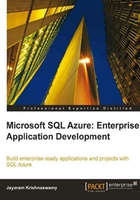
There are several types of cloud implementations and they sharply differ from on-premises services in that the resources are shared by more than one party or business. Some of the most popular and widely known services are of the following types:
This is strictly using the infrastructure where you access storage and virtual servers in the cloud. The storage and servers are of the industry standard, which you can add or remove depending on your requirements (your load characteristics).
Here, Platform on the cloud is where you execute the application. You use the platform specific programming API. The provider completely supports the maintenance of programs, diagnostic and monitoring, and so on — a one stop service for all web-based applications.
In this case, users don't own the software but rent it. Users also don't concern themselves with the maintenance of the program or the servers on which it is hosted.
Some examples of SaaS are the Sales Force automation, financial services, content management, and collaboration. However, content management is also supported on vendors who are typically IaaS and PaaS providers.
In the hybrid, it is not entirely cloud that is hosting the applications, a part of hardware and software also exists on premises. There are various implementations of this and it is customizable.
While Security and Privacy are some of the concerns, the round-the-clock availability and performance are the most attractive features. Looking into the near future, cloud appliances will make their debut, which offers a packaged 'mini-cloud' to enterprises to host cloud applications to address some of the security and privacy-related concerns. With the cloud appliance the complete infrastructure is under lock and key and owned by the enterprise without the security concerns of a cloud service.
How does Microsoft Azure Cloud offering measure up? From what you will read further on, you will notice that Microsoft Windows Azure not only provides the agile infrastructure at its globally dispersed data centers and its Windows Azure Platform OS but it also provides a scalable relational database. Azure AppFabric provides support for security and privacy as well as hybrid applications. Microsoft is also moving forward with Windows Azure Appliances (review this link: http://www.microsoft.com/windowsazure/appliance/) for private Windows Azure Cloud systems that run on user data centers. The Windows Azure platform is, therefore, all of IaaS, PaaS, and SaaS bundled into an integrated offering.